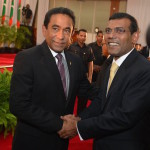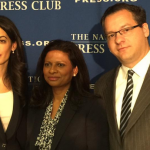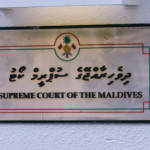The ministry of education signed management contracts with seven province offices yesterday to decentralise certain administrative functions of the ministry.
Minister of Education Musthafa Luthfy signed the contract on behalf of the Ministry and state ministers for each province signed on behalf of their province.
President Mohamed Nasheed said the government intended to eventually shift all the ministry’s powers and services to the province offices.
Dividing the Maldvies into seven provinces was one of the five election pledges Nasheed made in 2008, a move that has met with considerable controversy in parliament to the extent of stalling it completely in the closing sessions of its last sitting.
Independent MP Mohamed Nasheed said the government’s plan to “wipe out” the atolls from the Maldives by dividing them into provinces was against the law.
”The government is physically trying to re-distribute the country – it is not advisable,” Nasheed said.
Nasheed said the president could name ministries, provide offices and give them whatever powers he wished, but there were no provinces in the Maldives “according to the law.”
Furthermore, he claimed it was “not wise” for the president to beginning carrying out the work of decentralising the Maldives before parliament had approved it.
”We hope the next bill on decentralising the Maldives will include more compromise than the previous bill,” Nasheed added.






I hope decentralization can be beneficial to Maldives. However one question is roaming in my mind. That is, who and how will they finance activities and how the budget will be allocated. This is very crucial as once the decentralization is carried to empower and to give freedom in decision-making nothing can be done without financing such activities. I wish things are clearer and relevant stakeholders are involved in the process so that this policy can be implemented effectively. In this case the community, leaders of these provincial areas, furthermore civil servants and politicians can be involved in the process so that they can identify ways to make this work ie. if this is what they want. Another important thing is if we could engage in bottom-up approach in policy making rather than a top-down approach where the policy is made but those who needs to carry out does not know how to make it work and people who are going to be affected have no idea what is the difference or how it will impact them.
Spot on Amadey! The Decentralisation Bill have chapters not only on Administrative decentralisation, but also on Fiscal decentralisation. The government's bottom up proposal(when syncronised with the local government election bill) is quite comprehensive. It is probable the Civil Service we inherited may be short of the "capacity" to back the political appointees with government's policy initiatives. The Elections Commission estimate 4 months for preparation). The opposition wants to "dis-figure" the whole bill totally out of context...tough call really!